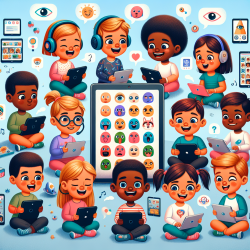As practitioners in the field of speech-language pathology, our goal is to utilize evidence-based methods to foster the best outcomes for children. One emerging tool in this endeavor is the use of virtual serious games, such as Deusto-e-motion1.0, which has shown promising results in assessing and improving the Theory of Mind (ToM) in primary school children.
Understanding the Theory of Mind
The Theory of Mind refers to the ability to understand, explain, and predict the psychological states of oneself and others. This includes recognizing emotional facial expressions, a skill that is crucial for social interaction and communication. A recent study, "Using a Virtual Serious Game (Deusto-e-motion1.0) to Assess the Theory of Mind in Primary School Children: Observational Descriptive Study," provides valuable insights into how we can leverage virtual serious games to enhance ToM in children.
Key Findings from the Research
The study involved 1,236 children aged 8-12 years and found significant differences in Deusto-e-motion1.0 scores based on age and gender. The game demonstrated concurrent validity with traditional instruments like the Feel test, supporting its efficacy in assessing emotional recognition. Key findings include:
- Older children performed better and had faster reaction times in recognizing facial expressions.
- Gender differences were observed in the recognition of specific emotions such as sadness and disgust.
- Deusto-e-motion1.0 provides a dynamic and interactive environment that maintains children's motivation through rewards and feedback.
Implementing Deusto-e-motion1.0 in Practice
Given the study's findings, practitioners can integrate Deusto-e-motion1.0 into their therapy sessions to enhance children's ToM skills. Here are some practical steps:
- Assessment: Use Deusto-e-motion1.0 to evaluate children's baseline emotional recognition abilities. This can help in identifying specific areas that need improvement.
- Intervention: Incorporate the game into regular therapy sessions. The interactive nature of the game can make learning more engaging for children.
- Monitoring Progress: Regularly assess children's progress using the game to ensure they are improving in their ability to recognize and respond to emotional cues.
Encouraging Further Research
While Deusto-e-motion1.0 has shown promising results, further research is needed to explore its long-term impact and efficacy across diverse populations. Practitioners are encouraged to contribute to this growing body of knowledge by conducting their own studies and sharing their findings.
To read the original research paper, please follow this link: Using a Virtual Serious Game (Deusto-e-motion1.0) to Assess the Theory of Mind in Primary School Children: Observational Descriptive Study.










